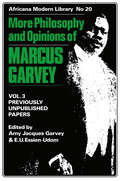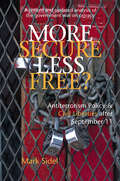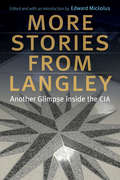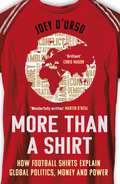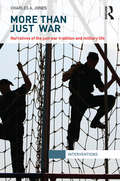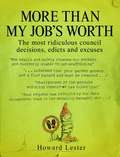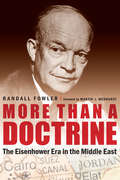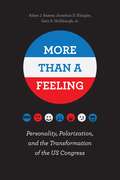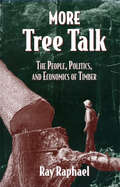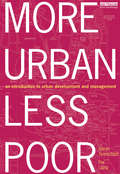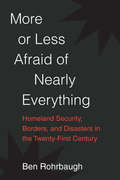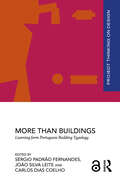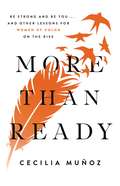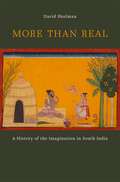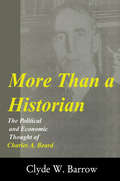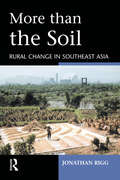- Table View
- List View
More Philosophy and Opinions of Marcus Garvey: Or, Africa For The Africans (New Marcus Garvey Library #No. 9)
by Amy Jacques GarveyFirst published in 2004. Routledge is an imprint of Taylor & Francis, an informa company.
More Scottish than British
by Robert Johns James Mitchell Christopher CarmanUsing official statistics, this book explores how the SNP managed to confound expectations and win a parliamentary majority in the 2011 Scottish General Election. Perhaps surprisingly, it was not constitutional politics or the return of the Conservatives to power in Westminster but domestic issues that decided the vote in the SNP's favour.
More Secure, Less Free?: Antiterrorism Policy and Civil Liberties after September 11
by Mark SidelThe first comprehensive analysis of the full range of antiterror initiatives undertaken in the United States after the 2001 terrorist attacks Unlike earlier books published shortly after the September 11 attacks that focus on the Patriot Act, More Secure, Less Free? covers the Patriot Act but goes well beyond, analyzing Total Information Awareness, Terrorist Information and Prevention System (TIPS), Computer Assisted Passenger Prescreening System II (CAPPS II), and a number of other "second wave" antiterror initiatives. It's also the first book of its kind to go beyond federal measures to explain the devolution of antiterror policies to the states, and now to the military as well. Author Mark Sidel discusses the continuing debates on antiterror law at the state level, with a focus on the important states of New York, California, and Michigan, and explains how the military-through an informant program known as "Eagle Eyes"-is now taking a direct hand in domestic antiterror efforts. The volume also discusses and analyzes crucially important aspects of American antiterror policy that have been largely ignored in other volumes and discusses the effects of antiterror policy on the American academic world and the American nonprofit sector, for example. And it provides the first comparative perspectives on U.S. antiterror policy yet published in an American volume, discussing antiterror initiatives in Great Britain, Australia, and India and contrasting those to the American experience. More Secure, Less Free? is important and essential reading for anyone interested in an analytical perspective on American antiterror policy since September 11 that goes well beyond the Patriot Act.
More Stories from Langley: Another Glimpse inside the CIA
by Edward MickolusWho knew the CIA needed librarians? More Stories from Langley reveals the lesser-known operations of one of the most mysterious government agencies in the United States. Edward Mickolus is back with more stories to answer the question, &“What does a career in the CIA look like?&” Advice and anecdotes from both current and former CIA officers provide a look at the side of intelligence operations that is often left out of the movies. What was it like working for the CIA during 9/11? Do only spies get to travel? More Stories from Langley has physicists getting recruited to &“the agency&” during the Cold War, foreign-language majors getting lucky chances, and quests to &“learn by living&” turning into sweaty-palmed calls to the U.S. embassy after being detained by Russian intelligence officers. The world only needs so many suave super spies. More Stories from Langley shows how important academics, retired soldiers, and bilingual nannies can be in preserving the security of our nation.
More Than A Shirt: How Football Shirts Explain Global Politics, Money and Power
by Joey D'Urso'Extensively researched and wonderfully written, Joey's book deserves to be read by all' Martin O'Neill'There's more to every aspect of football than meets the eye, and that's brilliantly captured here' Adrian Chiles'Intelligent, thoughtful and brilliant' Chris Mason, BBC News'Colourful... a treat for anyone interested in football and politics' Patrick Maguire, The Times'Original and innovative... a "Parts Unknown" for the game' Miguel Delaney, Independent'Smart, warm and original' Matt Chorley, BBC Radio 5 Live______________________________Twenty-Two Football Shirts that explain the world, geopolitics and the biggest stories of our timeFootball is the world's most popular sport, and the shirts worn by teams and their supporters are its greatest means of cultural expression. Every year clubs launch new kits with increasingly extravagant marketing campaigns and convoluted explanations of how their designs reflect their history and local community. But football shirts are much more than just a symbol of which club we support. A seemingly innocuous combination of colours, sponsor logos and materials can all reflect the social values, financial struggles and political ideologies of the day, as geopolitical issues increasingly seep into every aspect of the game. Investigative journalist Joey D'Urso has travelled across the globe, combining on-the-ground reporting with unparalleled analysis to collate a list of the twenty-two football shirts that best explain the modern world. More Than A Shirt will take fans on a journey from Birmingham to Belgrade and onto Medellin and Mumbai, outlining how we can see the war in Ukraine in the shirt of Schalke in Germany or China's foreign policy in West Bromwich Albion's; how the shirts of state-owned clubs are used for sportswashing; and why the French national kit embodies worldwide migration patterns. A compelling and eye-opening exploration, More Than A Shirt is essential reading for any football fan and will change the way you think about the beautiful game's most universal symbol.
More Than A Shirt: How Football Shirts Explain Global Politics, Money and Power
by Joey D'Urso'Extensively researched and wonderfully written, Joey's book deserves to be read by all' Martin O'Neill'There's more to every aspect of football than meets the eye, and that's brilliantly captured here' Adrian Chiles'Intelligent, thoughtful and brilliant' Chris Mason, BBC News'Colourful... a treat for anyone interested in football and politics' Patrick Maguire, The Times'Original and innovative... a "Parts Unknown" for the game' Miguel Delaney, Independent'Smart, warm and original' Matt Chorley, BBC Radio 5 Live______________________________Twenty-Two Football Shirts that explain the world, geopolitics and the biggest stories of our timeFootball is the world's most popular sport, and the shirts worn by teams and their supporters are its greatest means of cultural expression. Every year clubs launch new kits with increasingly extravagant marketing campaigns and convoluted explanations of how their designs reflect their history and local community. But football shirts are much more than just a symbol of which club we support. A seemingly innocuous combination of colours, sponsor logos and materials can all reflect the social values, financial struggles and political ideologies of the day, as geopolitical issues increasingly seep into every aspect of the game. Investigative journalist Joey D'Urso has travelled across the globe, combining on-the-ground reporting with unparalleled analysis to collate a list of the twenty-two football shirts that best explain the modern world. More Than A Shirt will take fans on a journey from Birmingham to Belgrade and onto Medellin and Mumbai, outlining how we can see the war in Ukraine in the shirt of Schalke in Germany or China's foreign policy in West Bromwich Albion's; how the shirts of state-owned clubs are used for sportswashing; and why the French national kit embodies worldwide migration patterns. A compelling and eye-opening exploration, More Than A Shirt is essential reading for any football fan and will change the way you think about the beautiful game's most universal symbol.
More Than A Shirt: How Football Shirts Explain Global Politics, Money and Power
by Joey D'Urso'Extensively researched and wonderfully written, Joey's book deserves to be read by all' Martin O'Neill'There's more to every aspect of football than meets the eye, and that's brilliantly captured here' Adrian Chiles'Intelligent, thoughtful and brilliant' Chris Mason, BBC News'Colourful... a treat for anyone interested in football and politics' Patrick Maguire, The Times'Original and innovative... a "Parts Unknown" for the game' Miguel Delaney, Independent'Smart, warm and original' Matt Chorley, BBC Radio 5 Live______________________________Twenty-Two Football Shirts that explain the world, geopolitics and the biggest stories of our timeFootball is the world's most popular sport, and the shirts worn by teams and their supporters are its greatest means of cultural expression. Every year clubs launch new kits with increasingly extravagant marketing campaigns and convoluted explanations of how their designs reflect their history and local community. But football shirts are much more than just a symbol of which club we support. A seemingly innocuous combination of colours, sponsor logos and materials can all reflect the social values, financial struggles and political ideologies of the day, as geopolitical issues increasingly seep into every aspect of the game. Investigative journalist Joey D'Urso has travelled across the globe, combining on-the-ground reporting with unparalleled analysis to collate a list of the twenty-two football shirts that best explain the modern world. More Than A Shirt will take fans on a journey from Birmingham to Belgrade and onto Medellin and Mumbai, outlining how we can see the war in Ukraine in the shirt of Schalke in Germany or China's foreign policy in West Bromwich Albion's; how the shirts of state-owned clubs are used for sportswashing; and why the French national kit embodies worldwide migration patterns. A compelling and eye-opening exploration, More Than A Shirt is essential reading for any football fan and will change the way you think about the beautiful game's most universal symbol.
More Than Just War: Narratives of the Just War and Military Life (Interventions)
by Charles JonesThis book raises questions about the just war tradition through a critical examination of its revival and by juxtaposing it with a literary phenomenology of war. Recent public debate about war has leaned heavily on a just-war tradition dating back many centuries. This book examines the recent revival of that tradition in the United States and Britain, arguing that it is less coherent and comprehensive as an approach to the ethical issues arising from war than is generally supposed, and that it is inconsistent in important ways with the theology on which it was originally based. A second line of criticism is mounted through close readings of modern texts in English - from Britain, Australia and the USA – that together constitute a more subjective, bottom-up understanding of the moral dilemmas of military life. In this second tradition the task of representing war is seen as more problematic, and its rationality more questionable, than in just war discourse. Works by William Shakespeare, Sir Walter Scott, James Fennimore Cooper, Stephen Crane, John Buchan, Robert Louis Stevenson, Joseph Conrad, Tim O’Brien and Kurt Vonnegut are featured. The book will be of great interest to students and scholars of security studies, military studies, theology and international relations.
More Than Medicine: Nurse Practitioners and the Problems They Solve for Patients, Health Care Organizations, and the State (The Culture and Politics of Health Care Work)
by LaTonya J. TrotterIn More Than Medicine, LaTonya J. Trotter chronicles the everyday work of a group of nurse practitioners (NPs) working on the front lines of the American health care crisis as they cared for four hundred African American older adults living with poor health and limited means. Trotter describes how these NPs practiced an inclusive form of care work that addressed medical, social, and organizational problems that often accompany poverty. In solving this expanded terrain of problems from inside the clinic, these NPs were not only solving a broader set of concerns for their patients; they became a professional solution for managing "difficult people" for both their employer and the state. Through More Than Medicine, we discover that the problems found in the NP's exam room are as much a product of our nation's disinvestment in social problems as of physician scarcity or rising costs.
More Than My Job's Worth
by Howard LesterDid you know that it is illegal to die in the Houses of Parliament? Were you aware that it is perfectly legal to murder a Scotsman within the wall of the ancient city of York, but only if he is carrying a bow and arrow? Outrageous and hilarious rules and regulations pack the pages of More Than My Job's Worth along with incredible stories of officialdom gone mad. How about the story of a couple in Surrey who cleared an eyesore of weeds, litter, wrecked shopping trolleys and bits of an old car from the area outside their front fence, dug the ground over and put in some plants to make it all look nice for passers-by? The local council told them that unless they paid for a permit, they had to put everything back exactly as it was!You couldn't make it up, as they say, but you don't need to because it's all true! By the way, you need the permission of the Secretary of State if you want to enter the hull of the Titanic, and in Connecticut, USA a pickle cannot be classed as a pickle unless it can bounce!
More Than They Bargained For
by Jason Stein Patrick MarleyWhen Wisconsin became the first state in the nation in 1959 to let public employees bargain with their employers, the legislation catalyzed changes to labor laws across the country. In March 2011, when newly elected governor Scott Walker repealed most of that labor law and subsequent ones and then became the first governor in the nation to survive a recall election fifteen months later it sent a different message. Both times, Wisconsin took the lead, first empowering public unions and then weakening them. This book recounts the battle between the Republican governor and the unions. The struggle drew the attention of the country and the notice of the world, launching Walker as a national star for the Republican Party and simultaneously energizing and damaging the American labor movement. Madison was the site of one unprecedented spectacle after another: 1:00 a. m. parliamentary maneuvers, a camel slipping on icy Madison streets as union firefighters rushed to assist, massive nonviolent street protests, and a weeks-long occupation that blocked the marble halls of the Capitol and made its rotunda ring. Jason Stein and Patrick Marley, award-winning journalists for the Milwaukee Journal Sentinel, covered the fight firsthand. They center their account on the frantic efforts of state officials meeting openly and in the Capitols elegant backrooms as protesters demonstrated outside. Conducting new in-depth interviews with elected officials, labor leaders, police officers, protestors, and other key figures, and drawing on new documents and their own years of experience as statehouse reporters, Stein and Marley have written a gripping account of the wildest sixteen months in Wisconsin politics since the era of Joe McCarthy. They offer new insights on the origins of Walkers wide-ranging budget-repair bill, which included the provision to end public-sector collective bargaining; the Senate Democrats decision to leave the state to try to block the bill; Democrats talks with both union leaders and Republicans while in Illinois; and the reasons why compromise has become, as one Republican dissenter put it, a "dirty word" in politics today.
More Than You Wanted to Know: The Failure of Mandated Disclosure
by Omri Ben-Shahar Carl E. SchneiderHow mandated disclosure took over the regulatory landscape—and why it failedPerhaps no kind of regulation is more common or less useful than mandated disclosure—requiring one party to a transaction to give the other information. It is the iTunes terms you assent to, the doctor's consent form you sign, the pile of papers you get with your mortgage. Reading the terms, the form, and the papers is supposed to equip you to choose your purchase, your treatment, and your loan well. More Than You Wanted to Know surveys the evidence and finds that mandated disclosure rarely works. But how could it? Who reads these disclosures? Who understands them? Who uses them to make better choices?Omri Ben-Shahar and Carl Schneider put the regulatory problem in human terms. Most people find disclosures complex, obscure, and dull. Most people make choices by stripping information away, not layering it on. Most people find they can safely ignore most disclosures and that they lack the literacy to analyze them anyway. And so many disclosures are mandated that nobody could heed them all. Nor can all this be changed by simpler forms in plainer English, since complex things cannot be made simple by better writing. Furthermore, disclosure is a lawmakers' panacea, so they keep issuing new mandates and expanding old ones, often instead of taking on the hard work of writing regulations with bite.Timely and provocative, More Than You Wanted to Know takes on the form of regulation we encounter daily and asks why we must encounter it at all.
More Than a Doctrine: The Eisenhower Era in the Middle East
by Martin J. Medhurst Randall FowlerGiven on January 5, 1957, the Eisenhower Doctrine Address forever changed America’s relationship with the Middle East. In the aftermath of the Suez Crisis, President Dwight D. Eisenhower boldly declared that the United States would henceforth serve as the region’s “protector of freedom” against Communist aggression. Eighteen months later the president invoked the Eisenhower Doctrine, landing troops in Lebanon and setting an enduring precedent for U.S. intervention in the Middle East. How did Eisenhower justify this intervention to an American public wary of foreign entanglements? Why did he boldly issue the doctrine that bears his name? And, most important, how has Eisenhower’s rhetoric continued to influence American policy and perception of the Middle East? Randall Fowler answers these questions and more in More Than a Doctrine. With the expansion of America’s global influence and the executive branch’s power, presidential rhetoric has become an increasingly important tool in U.S. foreign policy—nowhere more so than in the Middle East. By examining Eisenhower’s rhetoric, More Than a Doctrine explores how the argumentative origins of the Eisenhower Doctrine Address continue to impact us today.
More Than a Feeling: Personality, Polarization, and the Transformation of the US Congress
by Adam J. Ramey Gary E. Hollibaugh Jr. Jonathan D. KlinglerWhatever you think about the widening divide between Democrats and Republicans, ideological differences do not explain why politicians from the same parties, who share the same goals and policy preferences, often argue fiercely about how best to attain them. This perplexing misalignment suggests that we are missing an important piece of the puzzle. Political scientists have increasingly drawn on the relationship between voters’ personalities and political orientation, but there has been little empirically grounded research looking at how legislators’ personalities influence their performance on Capitol Hill. With More Than a Feeling, Adam J. Ramey, Jonathan D. Klingler, and Gary E. Hollibaugh, Jr. have developed an innovative framework incorporating what are known as the Big Five dimensions of personality—openness to experience, conscientiousness, extraversion, agreeableness, and neuroticism—to improve our understanding of political behavior among members of Congress. To determine how strongly individuals display these traits, the authors identified correlates across a wealth of data, including speeches, campaign contributions and expenditures, committee involvement, willingness to filibuster, and even Twitter feeds. They then show how we might expect to see the influence of these traits across all aspects of Congress members’ political behavior—from the type and quantity of legislation they sponsor and their style of communication to whether they decide to run again or seek a higher office. They also argue convincingly that the types of personalities that have come to dominate Capitol Hill in recent years may be contributing to a lot of the gridlock and frustration plaguing the American political system.
More Time for Politics: Diaries 2001-2007
by Tony BennWhen Tony Benn left Parliament after 51 years he quoted his wife Caroline's remark that now he would have 'more time for politics'. And so this has proved: in the first seven years of this century he has helped reinvigorate national debate through public meetings, mass campaigns and appearances in the media, passionately bringing moral and political issues to wide audiences. And throughout, as ever, he has been keeping his diaries.Commenting on the demise of the New Labour project from the re-election of Tony Blair in 2001 to the ultimate foreign policy disasters of Afghanistan and Iraq, he gives other prescient accounts of the government's by-passing of Cabinet, parliament and the party, of the 'war on terror', the debate about Islam, globalisation and the changes in British society. Although he is no longer in power or in parliament, Tony Benn remains a figure of enormous respect whose direct views, honestly expressed, have often awakened the national conscience. His latest Diaries, human and challenging in turn, are an enthralling read.
More Tree Talk: The People, Politics, and Economics of Timber
by Ray RaphaelMore Tree Talk is an insightful and compelling look at the human dimension of the challenges facing forestry. First published in 1981, Tree Talk was widely hailed as the most even-handed and well-written introduction to forestry issues available. More Tree Talk is an entirely revised edition of that classic volume that brings the book up-to-date with the current situation.Like the original, More Tree Talk features a running narrative punctuated by individual portraits that personalize the issues. It translates political and academic aspects of forestry into human terms, focusing on those whose lives and livelihoods depend on the outcome of the debates currently raging -- old-time woodsmen, loggers, naturalists, restoration workers, timber company executives.Ray Raphael explores the new forestry practices, theories, and controversies that have emerged in the past decade as he addresses problems of a declining resource base and increasing regulatory policies. He examines the impact of ecological and economic concerns on rural communities, and considers the possibility of large structural changes in the ways in which timber companies operate. Throughout, he emphasizes that without an understanding of the economic and political factors that interfere with good forest management, all the scientific knowledge -- and all the best intentions of on-site workers -- will come to no avail.
More Urban Less Poor: An Introduction to Urban Development and Management
by Goran Tannerfeldt Per LjungA world more urban... The world is undergoing massive urbanization, and is projected to increase from three to over four billion city dwellers, mostly in the developing world, within 15 years. This historic shift is producing dramatic effects on human well-being and the environment. ...but less poor Unplanned shanty-towns without basic services are not an inevitable consequence of urbanization and slums are not explained by poverty alone. Urban misery also stems from misguided policies, inappropriate legal frameworks, dysfunctional markets, poor governance, and not least, lack of political will. Urbanization and economic development go hand-in-hand and the productivity of the urban economy can and should benefit everyone. Living conditions for the urban poor can be dramatically improved with proper solutions, backed by decisive, concerted action. More Urban - Less Poor brings order to the complex and important field of urban development in developing and transitional countries. Written in an accessible style, the book examines how cities grow, their economic development, urban poverty, housing and environmental problems. It also examines how to face these challenges through governance and management of urban growth, the finance and delivery of services, and finding a role for development cooperation. This is essential reading for development professionals, researchers, students and others working on any facet of urban development and management in our rapidly urbanizing world. Published with SIDA
More or Less Afraid of Nearly Everything: Homeland Security, Borders, and Disasters in the Twenty-First Century
by Ben RohrbaughMigration, borders, cybersecurity, natural disasters, and terrorism: Homeland security is constantly in the news. Despite ongoing attention, these problems seem to be getting bigger even as the political discussion grows more overheated and misleading. Ben Rohrbaugh, a former border security director at the White House’s National Security Council, cuts through the noise to provide an accessible and novel framework to understand both homeland security and the thinking around how to keep civilians safe. Throughout the twentieth century, the United States did not experience national security domestically; it defended its borders by conducting military, foreign policy, and intelligence operations internationally, and then separated these activities from domestic law enforcement with bright legal lines. In the twenty-first century, U.S. national security no longer occurs exclusively outside of the nation. The U.S. government is beginning to respond to this change, and the establishment of the Department of Homeland Security is merely the first step in an organizational and strategic realignment that will be a long, difficult, and mistake-filled process. More or Less Afraid of Nearly Everything is an accessible and engaging guide to homeland security, particularly migration and border security, that makes innovative arguments about the American government and keeping citizens safe, and provides practical solutions to real-world problems.
More than Buildings: Learning from Portuguese Building Typology (Project Thinking on Design)
by Sérgio Padrão Fernandes João Silva Leite Carlos Dias CoelhoMore than Buildings studies the buildings typology in Portuguese cities and their relationship with the program (the way in which it responds to a function), the territory where it is integrated and with time and the way in which built forms evolve.The book is structured around a set of key theoretical texts that highlight the potential of knowledge about typology (and its specific formal characteristics) in the production of new architectural objects. In this sense, the book has a didactic value based on the theoretical synthesis it produces, which allows it to expose certain spatial and formal attributes of the typologies and thus constitute a reference for new processes of architectural production. The method of analysis and decomposition of the case studies presented in each chapter provide a useful reading and interpretation key for different readers. The typology should be understood as a reference in the act of designing, demonstrating how to understand the elementary formal and spatial principles. For the municipal authorities, or other political decision-makers, the book will enable them to interpret the value of typology and its relevance in the production of cities. This data could be useful, for example, in planning actions that aim at preserving or converting urban areas of architectural value.The book will be relevant to readers within an academic framework and in the professional field engaged in work around architecture, cities, planning, and conservation.
More than Fighting for Peace?
by David CurranThis book provides a contemporary account of the linkages between the academic field of conflict resolution and the practice of military peacekeeping, through the lens of pre-deployment training for military personnel about to embark on UN peacekeeping operations. Military Personnel serving on United Nations peacekeeping operations are deployed into highly challenging post-conflict environments, where the likelihood of violence remains high. Moreover, these personnel are deployed part of a wider peace process, and are thus situated as an anchor point in a transition from war to peace. This dimension of their work therefore means that a range of skills and techniques are relied upon, which come not from traditional military training, but from other, non-traditional fields. It is into this gap where the academic field of conflict resolution has made a valuable contribution to understanding international peacekeeping. Since the 1970's, studies have sought to understand international peacekeeping as a necessary stage in conflict de-escalation, and ultimately transformation. From this, there is a history of engagement including studies which seek to understand the skills peacekeepers may need to assist them in their day to day activities, and the role that international peacekeeping plays in wider projects of conflict transformation.
More than Fighting for Peace?: Conflict Resolution, UN Peacekeeping, and the Role of Training Military Personnel (The Anthropocene: Politik—Economics—Society—Science #8)
by David CurranThis book provides a contemporary account of the linkages between the academic field of conflict resolution and the practice of military peacekeeping, through the lens of pre-deployment training for military personnel about to embark on UN peacekeeping operations. Military personnel serving on United Nations peacekeeping operations are deployed into highly challenging post-conflict environments, where the likelihood of violence remains high. Moreover, these personnel are deployed part of a wider peace process, and are thus situated as an anchor point in a transition from war to peace. This dimension of their work therefore means that a range of skills and techniques are relied upon, which come not from traditional military training, but from other, non-traditional fields. It is into this gap where the academic field of conflict resolution has made a valuable contribution to understanding international peacekeeping. Since the 1970’s, studies have sought to understand international peacekeeping as a necessary stage in conflict de-escalation, and ultimately transformation. From this, there is a history of engagement including studies which seek to understand the skills peacekeepers may need to assist them in their day to day activities, and the role that international peacekeeping plays in wider projects of conflict transformation.
More than Ready: Be Strong and Be You . . . and Other Lessons for Women of Color on the Rise
by Cecilia MunozAdvice and inspiration for women of color seeking new heights of influence, from the "incredible" top Latinx advisor to President Obama (Jennifer Palmieri, author of Dear Madam President).Women of color today are contributing to an unprecedented wave of "firsts"-whether they are the first in a family to attend college, the first to serve as CEO of a Fortune 500 company, or the first in public office, women of color are reaching new heights of influence. Cecilia Muñoz was a first, too, and she knows what it means to make her way without exemplars to follow. The first Latinx to lead the White House Domestic Policy Council, Muñoz draws lessons from the challenges she faced as the senior Hispanic person in the Obama White House and as a longtime powerful voice in the Civil Rights Movement. She shares her insights, along with those of some extraordinary women of color she met along the way, as an offering of inspiration to women of color who are no longer willing to be invisible or left behind. Full of invaluable lessons about working through fear, facing down detractors, and leading with kindness, Muñoz provides the thoughtful insight and tactical tools women of color need to be successful-without compromising who they are.
More than Real
by David ShulmanFrom the fifteenth to the eighteenth centuries, the major cultures of southern India underwent a revolution in sensibility reminiscent of what had occurred in Renaissance Italy. During this time, the imagination came to be recognized as the defining feature of human beings. More than Real draws our attention to a period in Indian history that signified major civilizational change and the emergence of a new, proto-modern vision. In general, India conceived of the imagination as a causative agent: things we perceive are real because we imagine them. David Shulman illuminates this distinctiveness and shows how it differed radically from Western notions of reality and models of the mind. Shulman's explication offers insightful points of comparison with ancient Greek, medieval Islamic, and early modern European theories of mind, and returns Indology to its rightful position of intellectual relevance in the humanities. At a time when contemporary ideologies and language wars threaten to segregate the study of pre-modern India into linguistic silos, Shulman demonstrates through his virtuoso readings of important literary works-works translated lyrically by the author from Sanskrit, Tamil, Telugu, and Malayalam-that Sanskrit and the classical languages of southern India have been intimately interwoven for centuries.
More than a Historian: The Political and Economic Thought of Charles A.Beard
by Clyde BarrowCharles A. Beard (1874-1948) was one of America's most influential historians and political scientists. He played a major role in founding the disciplines of history and political science, helped shape the teaching of social studies in the nation's public schools, and was one the nation's most popular public intellectuals. Yet in the second half of the twentieth century, Beard's reputation has been eroded by relentless criticism. Clyde W. Barrow argues that Beard's work has renewed relevance in light of recent theoretical debates about the new institutionalism, the crisis of the welfare state, and American foreign policy messianism. Barrow's takes Beard seriously as a political theorist, while challenging many misconceptions. For example, Beard's method of economic interpretation has been dismissed as Marxist, but Barrow carefully reconstructs the sources of Beard's thinking to demonstrate that his method owes more to historical and institutional economics and that his concept of state-society relations was in fact derived from Madison's Tenth Federalist. Barrow reconstructs Beard's theory of American political development using his concept of realistic dialectics, which viewed the clash between democracy (Jeffersonianism) and capitalism (Hamiltonianism) as the engine of American political development. During the 1930s, Beard suggested that the United States was making the transition to a higher form of social and industrial democracy that would supersede the contradiction of American political development. Notably, Beard was a critic of the New Deal and the liberal welfare state, because they failed to reconstruct the economic relations that reproduce inequalities of income, status, and power.Beard went on to voice his concern that at crucial junctures in American history, class struggle is diverted into international conflicts as popular leaders back down from a direct confrontation with the dominant capitalist elite. He analyzes American foreign policy as an extension of domestic economic policy and, in particular, a result of the failures of domestic economic policy. Beard's conception of American history plays itself out in a tragic cycle of imperialism and diversion that left him a disenchanted realist. This incisive study will be of interest to those intrested in the evolution of historical thinking.
More than the Soil: Rural Change in SE Asia
by Jonathan RiggMore than the Soil focuses on the social, cultural, economic and technological processes that have transformed rural areas of Southeast Asia. The underlying premise is that rural lives and livelihoods in this region have undergone fundamental change. No longer can we assume that rural livelihoods are founded on agriculture; nor can we assume that people envisage their futures in terms of farming. The inter-penetration of the rural and urban, and the degree to which rural people migrate between rural and urban areas, and shift from agriculture to non-agriculture, raises fundamental questions about how we conceptualise the rural Southeast Asia and the households to be found there.
